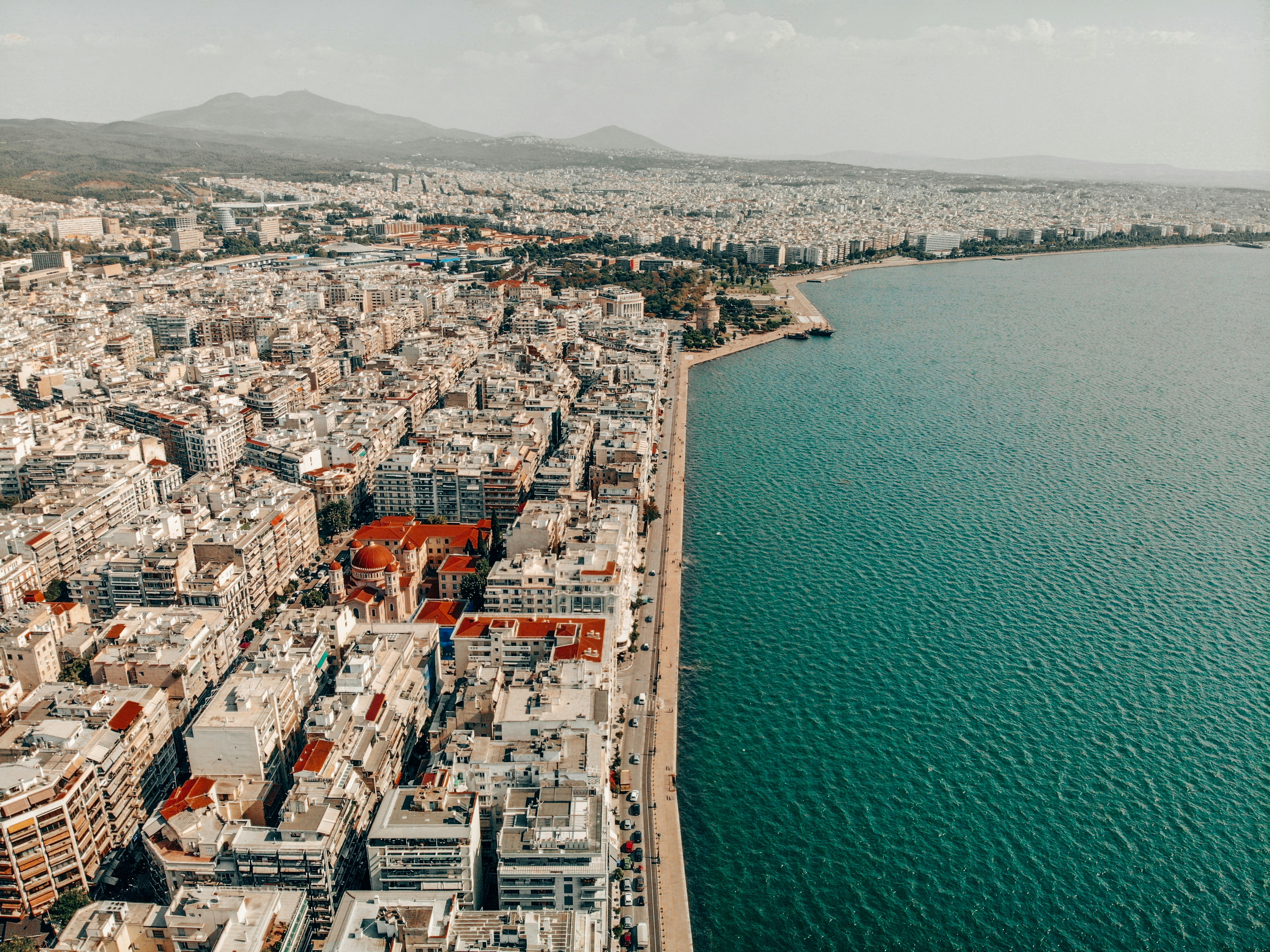Greece Digital Nomad Visa - 2025 Update

Quick Visa Facts
Visa length 12 months
Possible to extend? Yes, the residence permit can be renewed every 2 years.
Who can apply? Non-EU/EEA nationals working remotely for companies, clients, or businesses based outside of Greece.
Minimum Income Requirements Starting at €3,500/month approximately.
Time for visa applications Visa approval typically takes 10 working days.
Want to know if you can apply?
Complete a visa quiz and see if you qualify!
Imagine working from a sunny café in Athens, an island villa in Santorini, or a quiet seaside town along the Aegean, without giving up your career. That’s exactly what Greece’s Digital Nomad Visa makes possible.
Introduced in 2021 and updated in 2023, this visa is designed for remote workers, freelancers, and entrepreneurs who want to live in Greece while working for clients or employers abroad. With its rich history, vibrant culture, and affordable Mediterranean lifestyle, Greece has quickly become one of Europe’s most attractive destinations for digital nomads.
In this guide, we’ll walk you through everything you need to know about the Greece Digital Nomad Visa: who can apply, the financial requirements, how the application process works, and what life in Greece as a digital nomad really looks like.

Greece Digital Nomad Visa Overview
The Greece Digital Nomad Visa was first introduced in September 2021 under Law 4825/2021 and later updated through Law 5038/2023, which reshaped Greece’s immigration framework. It was created to attract skilled professionals who can work remotely while contributing to the local economy through their spending power, without competing with the domestic job market.
In short, this visa lets non-EU/EEA citizens live in Greece for up to 12 months initially, with the possibility to extend their stay by applying for a residence permit.
Who Is It For?
The visa is designed for:
Remote employees working for companies registered outside of Greece.
Freelancers and self-employed professionals with clients based abroad.
Entrepreneurs running businesses legally established outside of Greece.
To qualify, applicants must demonstrate a stable monthly income (currently starting at €3,500) and sufficient funds to support themselves and any dependents during their stay.
What Does It Allow You to Do?
Holders of the Greece Digital Nomad Visa can:
Live legally in Greece for up to one year, with the option to transition to a residence permit (valid for two years, renewable).
Work remotely for foreign employers, clients, or businesses.
Bring family members (spouse/partner and dependent children), provided income requirements are met.
Enjoy full residency rights within Greece, such as renting housing, accessing healthcare (via private insurance), and opening local bank accounts.
Important restriction: visa holders are not allowed to work for Greek companies or engage in professional activities within Greece’s local market.

Greece Digital Nomad Visa Requirements
To apply for the Greece Digital Nomad Visa, you’ll need to prepare a set of documents that prove your identity, financial stability, and ability to work remotely. Below is a list of the basic documents, followed by the special requirements that carry extra importance.
Basic documents required:
Completed application form (available through the Greek Consular Authority)
Recent passport-sized photographs.
Valid passport (with at least 6 months’ validity beyond your intended stay)
Proof of accommodation in Greece (rental agreement, hotel booking, or property deed)
Proof of employment or freelance activity abroad (employment contract, client agreements, business registration documents)
Criminal record certificate from your country of residence.
Receipt of application fee payment.
Proof of Financial Self-Sufficiency
Applicants must demonstrate a stable monthly income of at least €3,500 (after tax). This requirement increases if dependents are included:
€4,200/month if bringing a spouse.
€4,830/month if bringing a spouse and one dependent.
An additional €525/month for each additional dependent.
Accepted evidence includes:
Recent bank statements
Payslips or proof of salary transfers
Tax returns showing consistent income
Contracts confirming ongoing freelance or business activity
Private Health Insurance
You must provide proof of comprehensive health insurance that:
Covers medical and hospital care in Greece.
Is valid for the entire duration of your visa/residence permit.
Extends to family members if they are included in the application.
Travel insurance is not accepted; it must be long-term residency health insurance. You can find our recommendations for the best health insurance plans here.
Proof of Remote Work
A critical requirement is showing that your work is not tied to Greece’s local economy. You’ll need to submit one or more of the following:
A signed employment contract with a foreign company.
Proof of freelance contracts with international clients.
Documentation showing ownership of a foreign-registered business.

How to Apply for the Greece Digital Nomad Visa – Step-by-Step Instructions
Applying for the Greece Digital Nomad Visa is a straightforward process, but it requires careful preparation. Here’s a step-by-step guide to help you through:
Step 1: Gather Your Documents
Collect all the required documents, including your passport, application form, proof of income, employment contracts, accommodation details, criminal record certificate, and health insurance. Make sure all foreign documents are officially translated into Greek or English and, if required, apostilled.
Step 2: Submit Your Application
File your application with the Greek Consular Authority in your country of residence. Some embassies accept applications by appointment only, so check their specific procedure in advance.
Step 3: Pay the Application Fee
Pay the relevant consular fee when submitting your application. Keep the receipt as proof of payment; it is part of the required documentation.
Step 4: Attend an Interview (If Required)
In some cases, the consular office may request an interview. Be prepared to explain your remote work situation and how you plan to sustain yourself in Greece.
Step 5: Wait for Processing
Visa processing times can vary, but generally take a few weeks. During this period, the authorities verify your documents and eligibility.
Step 6: Receive Your Visa
If approved, you’ll receive the Digital Nomad Visa, typically valid for 12 months. You can now enter Greece and begin your stay as a legal resident.
Step 7: Apply for a Residence Permit (Optional)
If you want to stay longer than one year, you can apply for a Digital Nomad Residence Permit through the Greek Ministry of Migration and Asylum after your arrival in Greece. This permit is valid for two years and is renewable.

Greece Stay Requirements
Holders of the Greece Digital Nomad Visa are expected to reside primarily in Greece during the validity of their visa or residence permit. While short trips outside the country are allowed, the visa is intended for individuals who make Greece their main place of living.
To maintain compliance, applicants should avoid extended absences that suggest they are not genuinely based in Greece. Additionally, visa holders are prohibited from working for Greek employers or engaging in professional activities within the local economy; all work must remain with companies, clients, or businesses established abroad. Dependents included in the application are subject to the same residency expectations.

How Much Does the Greece Digital Nomad Visa Cost?
The overall cost of the Greece Digital Nomad Visa depends on both government fees and additional expenses related to preparing your application. Official fees are paid directly to the Greek authorities, while other costs vary depending on your personal situation. On average, you should budget for the following:
Visa application fee: approximately €75
Administrative fee (paravolo): approximately €150 when applying for the residence permit extension in Greece
Translation and legalization of documents: varies, usually between €10–€50 per document.
Private health insurance: depends on provider and coverage, often starting from €30–€60 per month
Criminal record certificate issuance: may involve a small fee in your home country.
Optional legal or visa assistance services: fees vary depending on whether you use a lawyer or a relocation agency.
Overall, while the government-set fees are relatively modest, the supporting costs for insurance, translations, and professional assistance can add up. Planning a budget of a few hundred euros beyond the official charges will help ensure a smooth application process.

Taxes for People With a Greece Digital Nomad Visa
Holding a Greece Digital Nomad Visa does not automatically make you a tax resident in Greece. The visa is designed for remote workers whose income comes from foreign employers, clients, or businesses, meaning that, at least in principle, your earnings remain taxable in your country of employment or business registration.
However, tax obligations in Greece depend on the 183-day rule. If you spend more than 183 days in Greece within a 12-month period, you may be considered a Greek tax resident. In that case, you would be required to declare your worldwide income in Greece, although double taxation treaties between Greece and many countries may prevent you from being taxed twice.
For those who choose to become tax residents, Greece has introduced favorable tax schemes to attract foreign professionals. In some cases, eligible individuals may benefit from a 50% income tax reduction for up to seven years, provided they transfer their tax residency to Greece and meet specific conditions under Greek law.
Because tax status can vary widely depending on your nationality, length of stay, and income sources, it is strongly recommended to consult with a tax advisor familiar with Greek and international tax law before relocating.

Living in Greece with the Digital Nomad Visa
Life in Greece as a digital nomad offers a unique balance of work and leisure. With its reliable internet infrastructure in major cities, affordable cost of living compared to much of Western Europe, and a vibrant expat community, it’s easy to settle into a productive routine while enjoying the Mediterranean lifestyle. From buzzing coworking spaces in Athens and Thessaloniki to seaside cafés on the islands, you’ll find plenty of options to create your ideal remote work environment.
Beyond work, Greece provides an enviable quality of life. The country’s rich cultural heritage, diverse landscapes, and mild climate make it easy to enjoy your time outside the laptop. Whether you’re exploring ancient ruins, island-hopping across the Cyclades, or savoring traditional Greek cuisine, everyday life feels like a blend of work and holiday. With the Digital Nomad Visa, you get to fully immerse yourself in Greek culture while maintaining your international career.
Best Cities to Live in Greece
Athens

As the capital and largest city, Athens is the hub for digital nomads in Greece. It offers excellent infrastructure, a growing number of coworking spaces, and reliable high-speed internet. Beyond work, Athens delivers a mix of modern city life and ancient history—you can finish a workday and be walking past the Acropolis within minutes. The city also has an international community, vibrant nightlife, and a wide range of affordable accommodation options, making it an ideal base for remote professionals.
Thessaloniki

Known as Greece’s “co-capital,” Thessaloniki blends a lively urban lifestyle with a slower pace than Athens. It’s famous for its café culture, waterfront promenade, and rich cultural events. The city is home to a large student population, giving it a youthful and creative vibe, while still offering lower living costs than the capital. With its international airport and strong connections to the Balkans, Thessaloniki is a great option for digital nomads seeking both accessibility and affordability.
Chania (Crete)

For those who dream of island life, Chania on Crete combines natural beauty with a welcoming atmosphere. This coastal city features stunning beaches, picturesque Venetian architecture, and a relaxed pace of life. While it’s smaller than Athens or Thessaloniki, Chania has a growing expat and nomad community, especially during the warmer months. With plenty of coworking-friendly cafés and outdoor lifestyle opportunities, it’s the perfect choice for digital nomads who value nature and Mediterranean charm alongside their work.
Cost of Living
The official currency of Greece is the Euro (€). 1 EUR = $1.1781 USD.
The average net monthly salary in Greece is around €1,098, which equates to approximately $1,292 USD.
Here’s a rundown of what you should expect to pay in different cities:
Athens
Rent (1 bedroom in city center): €650–€1,200 per month
Rent (3 bedrooms outside city center): €500–€900 per month
Basic Utilities (Electricity, Heating, Cooling, Water, Garbage): €150–€300 per month
Wi-Fi (60 Mbps or More, Unlimited Data, Cable/ADSL): €25–€40 per month
Public Transport (One-Way Ticket): €1.20
Groceries (2 people): €300–€500 per month
Thessaloniki
Rent (1 bedroom in city center): €500–€700 per month
Rent (3 bedrooms outside city center): €400–€600 per month
Basic Utilities (Electricity, Heating, Cooling, Water, Garbage): €150–€250 per month
Wi-Fi (60 Mbps or More, Unlimited Data, Cable/ADSL): €25–€40 per month
Public Transport (One-Way Ticket): €0.85
Groceries (2 people): €400–€600 per month
Chania (Crete)
Rent (1 bedroom in city center): €400–€700 per month
Rent (3 bedrooms outside city center): €300–€600 per month
Basic Utilities (Electricity, Heating, Cooling, Water, Garbage): €150–€250 per month
Wi-Fi (60 Mbps or More, Unlimited Data, Cable/ADSL): €25–€40 per month
Public Transport (One-Way Ticket): €1.50
Groceries (2 people): €350–€550 per month
FAQs
Who is eligible for the Greece Digital Nomad Visa?
The visa is designed for non-EU/EEA citizens who work remotely for companies, clients, or businesses based outside of Greece. Eligible applicants include employees, freelancers, and entrepreneurs who can demonstrate a stable income and meet other requirements like health insurance and a clean criminal record.
How long is the Greece Digital Nomad Visa valid?
The initial visa is valid for 12 months. After arrival in Greece, you can apply for a residence permit valid for two years, which is renewable as long as the eligibility criteria continue to be met.
Can I work for Greek companies while on this visa?
No. The Greece Digital Nomad Visa allows you to work only for companies or clients located outside Greece. Engaging in local employment or business activities is not permitted.
Do I have to pay taxes in Greece as a digital nomad?
If you spend less than 183 days in Greece per year, you generally remain a non-resident for tax purposes, meaning your foreign-earned income is not taxed in Greece. Spending more than 183 days may make you a Greek tax resident, with obligations depending on international tax treaties.
Can I bring my family with me on this visa?
Yes, spouses/partners and dependent children can be included in the application. Additional income requirements apply to cover dependents, and all family members must be covered by health insurance.
Author
Nadia Dardón is a content creator from Guatemala. She has worked fully remotely for the past six years as a copywriter, editor, and content creator, working for different industries. She started her digital nomad journey in 2022 and currently lives as an expat in Spain.
